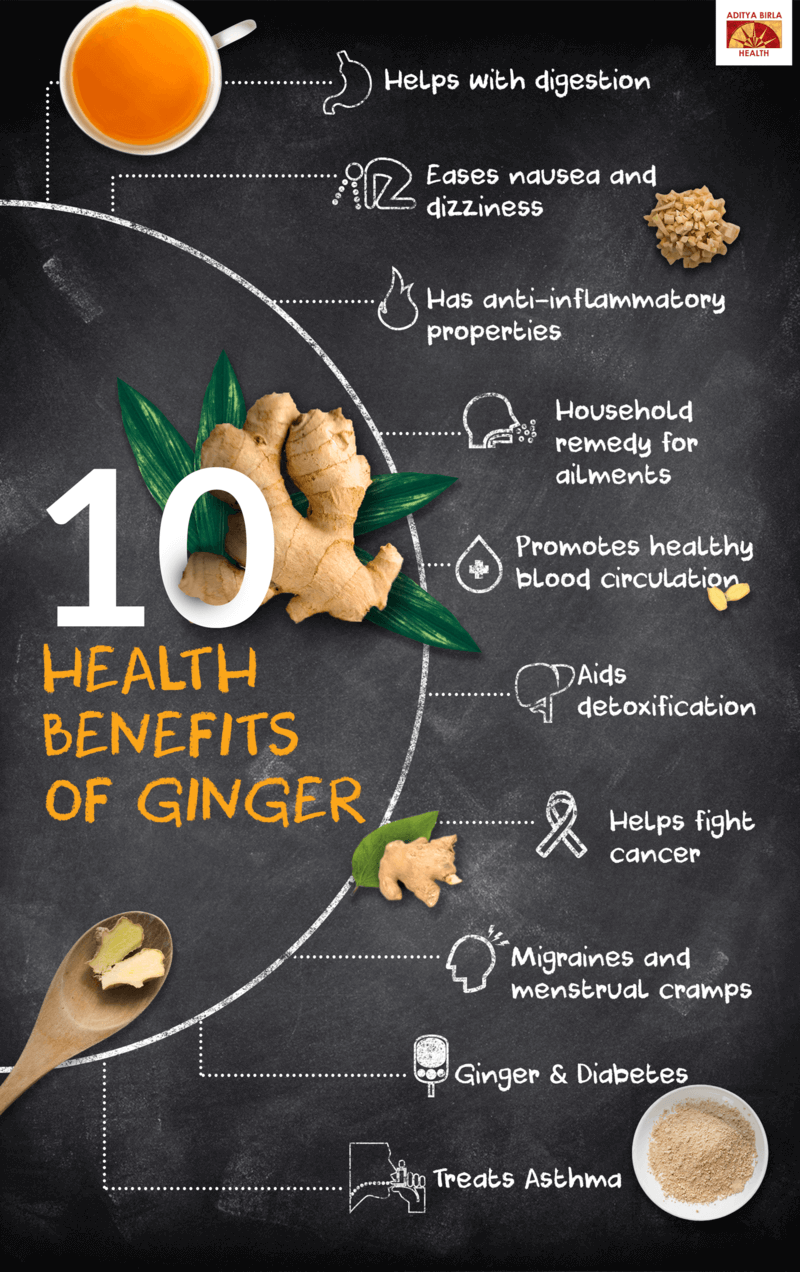
Ginger can be considered a ‘treasure chest’ of remedies. Ginger’s health benefits are plenty because of its antioxidant and anti-inflammatory properties. We have been using it for cooking and medicinal purposes for centuries. Regular consumption can help you manage weight and arthritis. It can help with nausea and stomach problems. When taken as a health supplement, it can also aid in managing the effects of type-2 diabetes. It has many healing properties.
What is ginger?
Ginger can be found in a flowering plant in Southeast Asia. Its tangy flavor adds zest to sweet and savory dishes. It comes from the Zingiberaceae family and resembles turmeric, cardamom and galangal. The part of the ginger that generally gets used is the rhizome, the underground part of the plant. It is also known as ginger root or just ginger. Different forms of ginger, like dried ginger to ginger oil and juice, can be used and added to various dishes.
This plant grows up to a height of about three feet and features clusters of greenish-purple flowers. Depending on the type of ginger plant, the color of the inside of the ginger root can vary from yellow and red to even white. While harvesting gingers, the entire plant is pulled off from the ground, the leaves are removed, and the root is cleaned.
Why is ginger a magical health herb?
Often referred to as a ‘magical health herb,’ it is believed that ginger’s health benefits come from its rich composition of about 100 bioactive compounds, such as shogaols, parasols, and gingerols. Due to its diverse therapeutic effects, this root has been a staple in traditional medicine systems such as Ayurveda, Chinese medicine, and other indigenous practises.
10 Health benefits of ginger
Here are some of the ginger health benefits you can get by adding it to your daily diet:
Better digestion
Ginger stimulates digestive enzymes, reducing indigestion and bloating. It enhances nutrient absorption and supports overall gut health. It has been found that consuming ginger before main meals can help you greatly to manage indigestion for people suffering from functional dyspepsia. In addition, it is also known that consuming ginger can help you to maintain healthy bowel movements through your digestive tract, resulting in a much lesser risk of constipation.
Improves immunity
People widely use ginger to recover from colds, flu and other infections. Fresh ginger can help protect your respiratory system greatly. Daily consumption of ginger can also help in boosting your immune system. Ginger also features a lot of antioxidants, resulting in enhanced immunity against several diseases.
Eases nausea and dizziness
Ginger positively affects the stomach lining, reducing irritation that can trigger nausea. It can also help relax the stomach muscles, preventing spasms contributing to sickness and nausea. Ginger is also known to affect serotonin receptors in the gut and brain. Its interaction with these receptors can help alleviate nausea and vomiting. Consuming ginger can also help you eliminate the gas in your intestines.
May help with weight management

Consuming ginger can keep you satiated for a long time. As a result, you can control hunger pangs, potentially leading to reduced calorie intake. Improved digestion through ginger consumption can aid in maximum nutrient absorption and reduce digestive discomfort. Efficient digestion supports your body’s ability to utilize nutrients, reducing cravings for high-calorie foods.
Can help with osteoarthritis
Ginger contains compounds like gingerol and its derivatives, which have anti-inflammatory effects. These compounds can help reduce the inflammation contributing to joint pain and stiffness in osteoarthritis. As it reduces inflammation, you can experience better joint function. Less inflammation means less swelling and stiffness, allowing for better mobility and range of motion.
Soothes sore muscles
Ginger won’t eliminate muscle pain completely, but one of ginger’s health benefits is reducing soreness over time. Ginger has vasodilatory effects on our body, opening the blood vessels to reach sore places, resulting in faster recovery.
Keeps your mouth healthy

Keeping your mouth clean can also help with oral hygiene. Gingerols can stop oral bacteria from growing. These bacteria are also responsible for causing periodontal disease, a severe gum condition.
Lowers blood sugar
Oxidative stress can contribute to insulin resistance and impair the function of insulin-producing cells in the pancreas. Ginger’s antioxidant compounds can help reduce oxidative stress, supporting healthier insulin secretion and resulting in a stable blood sugar level. Ginger boosts insulin sensitivity, allowing cells to respond better to insulin’s actions and improving blood sugar control. According to research, some individuals took 1200-1300 mg of ginger daily for 13 weeks. It was found that their:
- Blood sugar levels decreased by 12%
- Their haemoglobin A1c levels got reduced by 10%
- The ratio between their apolipoprotein B/ apolipoprotein A-I was 28% lower
Treats asthma
Asthma is typically caused due to chronic inflammation and constriction of the airways, leading to breathing difficulties. Ginger’s anti-inflammatory properties help reduce airway inflammation, alleviating some asthma symptoms.
Helps with diabetes
Ginger’s anti-inflammatory properties may help prevent certain diabetes complications. So, it can be an effective addition to your diabetes treatment if you use it in moderation. Eating up to 4 grams per day may help lower your blood sugar levels and regulate insulin production. Ensure to talk to your doctor before adding it to your treatment regimen.
No matter the season, this wonderful spice is readily available in all households. Its distinctive, strong flavor, has been used in foods, juices, teas, curries, and even desserts. No wonder ginger is considered one of the most vital herbs.
Stay tuned to the Activ Living Community. Keep up to date with the latest health tips and trends through expert videos, podcasts, articles, and much more in nutrition, fitness, mindfulness, and lifestyle conditions like Asthma, Blood Pressure, Cholesterol, and Diabetes.
Stay tuned to the Activ Living Community. Keep up to date with the latest health tips and trends through expert videos, podcasts, articles, and much more on nutrition, fitness, mindfulness, and lifestyle conditions like Asthma, Blood Pressure, Cholesterol, and Diabetes. Activ Living ke saath sahi sehat ki shuruat ABHI karo.
You may also be interested in the following blogs:
Popular Searches
How to lower blood pressure | Fruits good for liver | Unhealthy foods | Ragi Benefits | Basal Metabolic Rate | Acupressure points for High Blood Pressure | Ayurvedic medicine for blood pressure | How to control cholesterol at home | Homeopathy for Asthma | Biological Age | Home remedies for TB | Natural beta blockers | Negative effects of internet | Types of walking | Blood pressure calculator | Blood sugar calculator | BMI Calculator





 1800-270-7000
1800-270-7000









It is pleasant to read your post and you give brilliant information. If its all the same to you keep posting such kind of illuminating stuff. Interesting article share and this blog is motivates more people to examining that blog.
I am really enjoying reading your well-written articles. It looks like you spend a lot of effort and time on your blog. thanks and best regards….
Great Post!
That was a beautiful read about ginger. Everyone know the benefits of ginger but still they does not use it in their diets. It may be because of its taste. Anyways I am going to include ginger in my daily diet for better results.
I want to to thank you for this good read!!
I definitely loved every little bit of it. I have you book marked to check out new stuff you post?
Heya! I’m at work browsing your blog from my new iphone 3gs!
Just wanted to say I love reading through your blog and
look forward to all your posts! Carry on the excellent work!
Wow that was strange. I just wrote an very long comment but after
I clicked submit my comment didn’t appear.
Grrrr… well I’m not writing all that over again. Anyways, just
wanted to say superb blog!
Hey there! I’m at work surfing around your
blog from my new iphone! Just wanted to say I love reading your
blog and look forward to all your posts! Keep up the excellent work!
Hey there, You’ve done a fantastic job. I’ll definitely digg it and in my view recommend to my friends.
I’m sure they’ll be benefited from this web site.
I have been absent for some time, but now I
remember why I used to love this site. Thanks, I’ll try and
check back more frequently. How frequently you update your web site?
Thank you for sharing with us, I think this website truly stands out :
D.
Wow, fantastic blog layout! How long have you been blogging for? you make blogging look easy. The overall look of your site is magnificent, as well as the content!
We came across a cool web site that you simply could possibly take pleasure in. Take a look if you want.
The information and facts talked about inside the post are a few of the most beneficial out there.
we came across a cool site that you could appreciate. Take a look should you want
very few internet websites that take place to be comprehensive below, from our point of view are undoubtedly effectively worth checking out
please pay a visit to the internet sites we adhere to, which includes this one particular, as it represents our picks through the web
The details mentioned within the write-up are a few of the ideal obtainable
Here is a great Weblog You may Locate Interesting that we Encourage You
here are some links to sites that we link to mainly because we believe they’re worth visiting
usually posts some very interesting stuff like this. If you are new to this site
one of our guests not too long ago proposed the following website
Here is a great Blog You may Discover Interesting that we Encourage You
“I couldn’t refrain from commenting. Very well written!”
we prefer to honor several other internet websites around the internet, even if they arent linked to us, by linking to them.
here are some hyperlinks to web sites that we link to simply because we assume they’re worth visiting
Here is a superb Weblog You might Discover Exciting that we Encourage You
usually posts some pretty fascinating stuff like this. If youre new to this site
The information mentioned inside the report are several of the most effective offered
we prefer to honor a lot of other web web-sites on the net, even though they arent linked to us, by linking to them. Below are some webpages really worth checking out
very handful of web sites that transpire to become detailed beneath, from our point of view are undoubtedly well really worth checking out
one of our visitors not long ago advised the following website
Excellent read, I just passed this onto a friend who was doing a little research on that. And he actually bought me lunch since I found it for him smile So let me rephrase that: Thanks for lunch!
usually posts some very intriguing stuff like this. If you are new to this site
Here is a great Weblog You might Locate Intriguing that we Encourage You
usually posts some incredibly exciting stuff like this. If youre new to this site
Thank you for your blog.Thanks Again. Will read on…
Good – I should certainly pronounce, impressed with your website. I had no trouble navigating through all tabs as well as related info ended up being truly easy to do to access. I recently found what I hoped for before you know it in the least. Quite unusual. Ishttps://www.roku-com-links.com/activate-espn/ likely to appreciate it for those who add forums or something, website theme . a tones way for your customer to communicate. Nice task.
Ginger is really useful for health. thanks for sharing
wow, awesome blog.
I like what you guys are up also. Such clever work and reporting!
Carry on the excellent works guys.